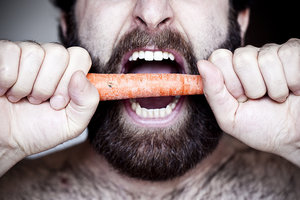
It is clear that social media is responsible for the current rapid growth, and that the young in particular are being sucked in. There is evidence of a sinister pressure shaming those who have not yet embraced this trend.
We know that vegetarians do not eat meat, fish or poultry. Vegans, in addition to being vegetarian, do not use other animal products and by-products such as eggs, dairy products, honey, leather, fur, silk, wool, cosmetics, and soaps derived from animal products.
The vegan lifestyle is chosen they advocate, for health, environmental, and/or ethical reasons. Some feel that by consuming eggs and dairy produce they are promoting the meat industry. That is, that once dairy cows or egg-laying chickens are too old to produce, they are sold as meat; and as male calves do not produce milk, they usually are raised for veal or other products.
Donald Watson coined the term vegan in 1944 when he co-founded the Vegan Society in this country. At first, he used it to mean “non-dairy vegetarian”, but from 1951 the society defined it as “the doctrine that man should live without exploiting animals”.
Interest in veganism increased in the 2010s, when more vegan stores opened, and vegan options became increasingly available in supermarkets and restaurants in many countries.
Some vegans will not buy natural clothing, or bedding that contains goose down or duck feathers, pearl jewellery, seashells, ordinary soap, or cosmetics that contain animal products. They avoid certain vaccines; the flu vaccine, for example, is usually grown in hens’ egg, although alternative Flublok is now available in the USA.
It is worth noting alternatives for leather, are mostly made from petroleum-based products, (plastics). This fact is increasingly triggering criticism because of the environmental damage involved in their production, and even more so now that we are increasingly aware of the extreme damage caused by their disposal in landfill, and now so graphically exposed by the catastrophic and haunting scenes witnessed by viewers of Blue Planet II.
It is fairly obvious that vegetarianism and veganism’s popularity grew during the time when ‘factory’ farming was in its ascendance.
Many urban dwellers still believe that farm animals are kept in overcrowded pens and cages, now banned in this country. Perhaps now is the time to step up the message and inform the public more graphically and loudly, reminding them that British farming has some of the highest welfare standards in the world. We do not rear calves in pens, or keep hens in cages.
Perhaps instead of being propelled by the opinions of environmentalists and the green lobby, Michael Gove could put his efforts into talking up British agriculture instead of criticising farming practises.
He should be praised for ensuring that any bad practises in slaughter houses will be exposed, particularly those dedicated to religious practises. Scenes from which are regularly exposed on vegan and vegetarian web sites.
It would be helpful if the Minister for Agriculture and the Environment also liaised with his colleagues in the department for Education, and made provision for all school children to spend time learning about where their food comes from. How it is produced and insist that every child spends time on a traditional livestock farm. It is essential that they learn about nature and the natural transition from field to fork.
Children brought up on farms develop an understanding and recognise the relationship we have with our livestock reared for food production. The cycle is natural, and they understand and accept the concept.
The young who are being encouraged to believe they will save the planet by living on vegetables and pulses, and wearing plastic, should be made aware that they could well be doing more harm than good.

 RSS Feed
RSS Feed